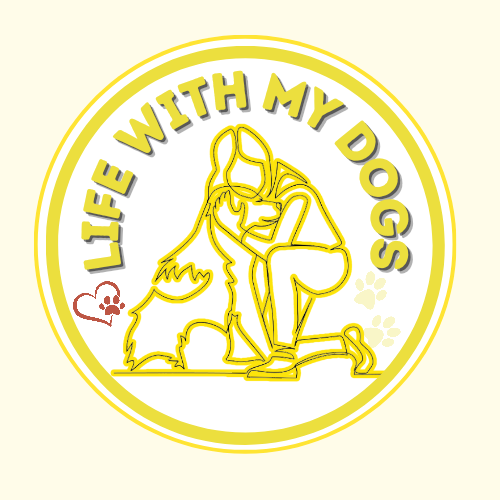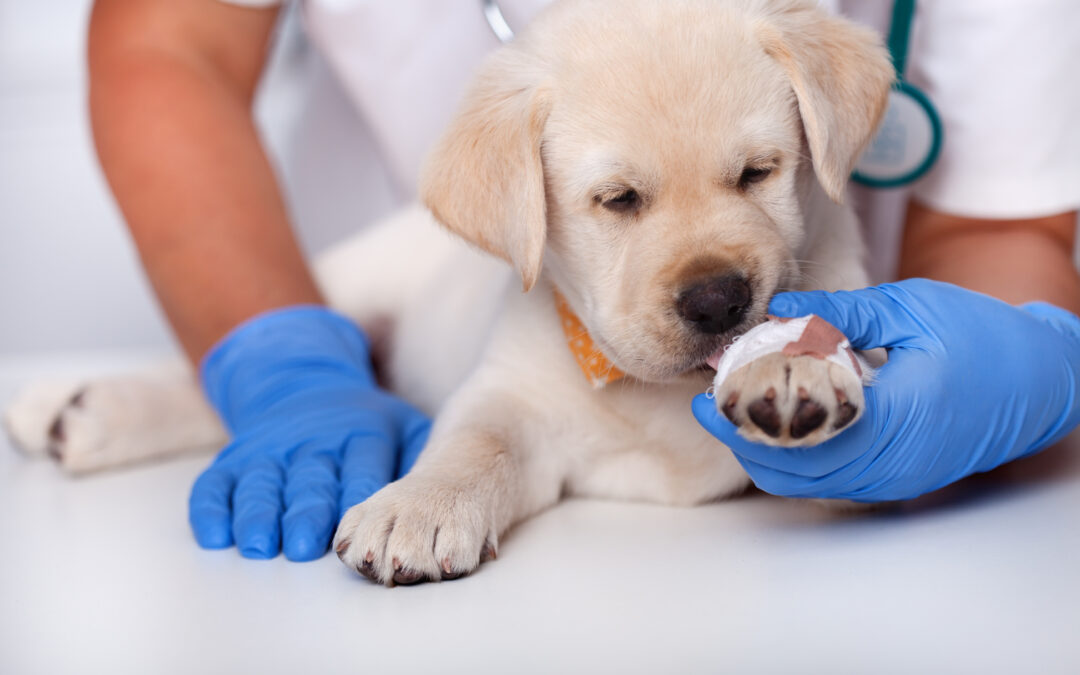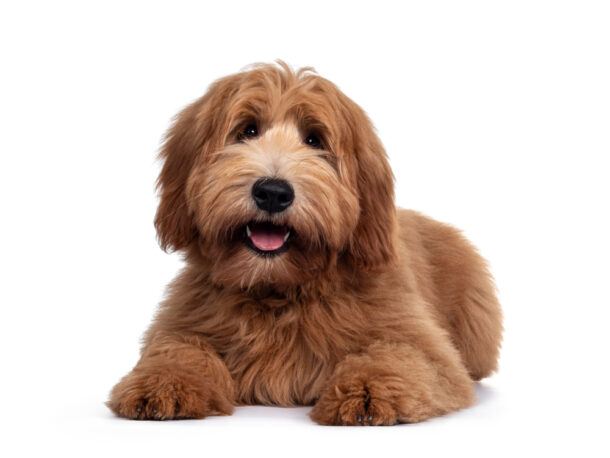LifeWithMyDogs is supported by our audience. When you purchase through one of our links, we may earn a small affiliate commission. As an Amazon Associate I earn from qualifying purchases. Your cost is not affected.
**********
Caring For A Dog Chewing Paws
It’s not uncommon to see a dog chewing paws yet this becomes a problem when it turns excessive. For pet owners and lovers, and their canine companions, it can be a bothersome experience. Extreme nibbling can cause a lot of issues, after all. These can be worrisome for pet parents who love their furry friends so much. Canines may also have inconveniences and pains. These may be symptoms of serious underlying conditions. Thus, sometimes, it matters to know how to stop dog from chewing paws.
It’s frustrating when a pooch keeps gnawing at its feet when you know it shouldn’t do that. Yet, many times, there are ways to stop a canine from nibbling its paws. In this post, we’ll explore the reasons why our four-legged pals have this behavior. Also included are the solutions to and preventive measures for this issue. So keep reading if you wish to know more about it and get some valuable tips that could help.
When Is This Issue A Serious Problem
Often, a dog chewing paws isn’t much of a problem. Canines do this to clean themselves and provide some relief for their feet. After all, unlike us humans, they aren’t wearing protection at the bottom of their front and hind paws. The pads on their feet get constant exposure to the ground. So it’s easy for them to catch and step on things.
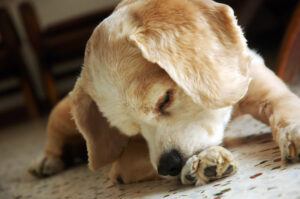
There’s no big issue when you see your four-legged friend bite and lick its feet. But immoderate nibbling and licking call for knowing how to stop dog from chewing paws. It’s likely time to consider serious treatment when there are major symptoms present. Usually, visible redness or disfigurements show a problem that needs immediate action. The presence of paw inflammation, drainage, cuts, sears, and fragments say the same. Having persistent, undesirable odors may suggest a disease or illness. When your canine is already limping or crying in pain, don’t delay and call a veterinarian for help.
Practical Tip
If you’re unsure of a problem’s seriousness, seek professional aid. In this way, you will find out if your pooch is displaying unusual behavior or otherwise. Still, it will allow you to see the nature of the problem and figure out your options to address the issue. Besides, your canine companion is already a member of your family. Thus it makes sense to treat your buddy well in times of need.
Reasons For Dog Chewing Paws
Abnormal nibbling is often easy to spot. After all, such activity usually causes distinguishable persistence and discomfort in dogs. Their behavior turns different and it may be difficult to control them when it happens. They keep doing so because of parasites, injuries, medical problems, and emotional issues. Hence, it’s important to pinpoint the exact cause to discover how to stop dog from chewing paws.
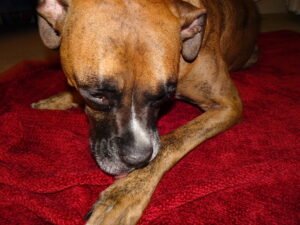
Here are some of what brings about the unreasonable paw-chewing in our furry friends.
Presence Of Injury, Debris, and Parasites
As mentioned, our four-legged pals aren’t wearing footwear like we are. With their feet exposed to the ground, a lot of things can get to them. Hence, nail and paw injuries aren’t uncommon. Dogs can get scraped or cut deep when they walk or run. Likewise, splinters and the like can penetrate their skin due to the lack of protection. Even worms, fleas, ticks, and mites can hide in the webbings of their feet. So, when your furry pal starts nibbling long and hard on its paws, check it. See if there are things there that you must cover and can remove.
Discovering a dog chewing paws with aggression means that it’s experiencing frustration. Sometimes, licking isn’t enough anymore so they resort to picking on the affected site. A canine’s saliva has plenty of antibodies that can aid in healing wounds too. Yet debris and some pests need extraction while some injuries demand strong medicine. In that way, a comprehensive assessment is almost always necessary. That is after noticing abnormal chewing patterns.
Allergies and Autoimmune Disorders
Hypersensitivity to proteins from food and environmental allergens may cause severe itching. The same is true with autoimmune diseases in canines. Their natural defenses mistake their normal cells for foreign ones and attack them. This somehow causes prickling sensations to surface. Examples of such are Pododermatitis and Lupoid Onchodystrophy. Because of these, feet-licking and paw-biting happen. Hence, it pays to know what’s exactly going on to find out the right treatment later.
There are yearly and seasonal allergies that surface. If a dog isn’t sneezing or doesn’t have red eyes, sometimes it has red and swollen feet. Autoimmune disorders also cause inflamed paws. When these occur, your canine friend may gnaw on not only one but four paws. Leaving these conditions untreated can lead to infection and other health problems. Thus it pays to understand them well and observe your pooch from time to time for any symptoms.
Boredom, Anxiety, and Other Emotional Issues
When anxious, such people bite their nails. It’s the same thing when you see a dog chewing paws. They resort to the activity to vent their emotions. Often, canines lick and nibble their front paws when responding to stressful situations. It may be an intentional or unintentional coping mechanism for them. Still, others resort to gnawing their feet to express their frustrations and irritability. They do it to use their stored energy to counter boredom too. So it’s unique why pooches do it. It’s only up to pet owners to figure out how to stop dog from chewing paws.
Treating and Preventing Their Feet-Nibbling Behavior
Pooches bite their paws or nails without stopping due to many reasons. With this in mind, discovering what causes the gnawing behavior should be a priority. After that, responding to it as soon as possible must be next. After all, ignoring the said problem may result in your buddy suffering from injuries.
Here are some of how you can respond well to having a dog chewing paws. Included are also some tips to avoid these issues from happening.
Injuries
Several things can wound canine paws. The act of nibbling and even licking a lot may injure the soft paw pads. Using a muzzle and Elizabethan collar usually helps somehow. That’s because these items prevent dogs from reaching their paws. Yet it isn’t advisable to always use them since prolonged use may result in canine hostility. Besides, the presence of parasites may irritate and even damage a dog’s skin too. They not only suck blood but also release chemicals that irritate and cause swelling in a dog’s skin. Still, it’s the same when a canine steps on hot surfaces and even grounds with pointed objects. Such things cause burns and splinters. To address these well, different strategies may work. It’s only up to pet owners to try them and figure out which ones work best.
Putting on canine boots on your furry friend’s paws could help prevent issues. They can provide adequate cover to keep dogs’ feet from becoming too warm or cold. Plus, they can ensure that a pooch doesn’t step on sharp items on the ground. Removing pests by manual extraction or the introduction of antiparasitic chemicals helps too. Still, because accidents happen and paws can get cut, have topical medicine for wound care. With such, at least infection gets prevented.
Allergy and Other Medical Conditions
For allergies and other health diseases, treatment involves keeping a distance from things. It means staying away from allergens and other causative agents. After all, sometimes, it’s what results in relief and recovery from disease. Still, when there is infection or severity, some measures may be necessary. For treatment, shampooing, foot soaking, and wiping could be useful. Oral medicines to address allergies and even kill pathogens are also available. In the case of autoimmune disorder, though, more extensive therapies may be appropriate. In any case, consult a veterinarian to get the best advice on how to stop dog from chewing paws.
But diet modification may be essential for allergies and other diseases too. It involves reducing or being selective in one’s protein intake. Vitamin supplementation may be helpful too. Like humans, our furry friends can do well and become healthy with the right nutrition. A vet may give canine tests to see which things it’s allergic to, though. Thus it makes sense to send your buddy to one if there are health concerns.
Addressing Emotional Issues
Consulting an animal behaviorist may help take care of a dog chewing paws. After all, such an expert often provides strategies pet owners can use to help their pets cope better. If you want an approach that doesn’t involve others, though, that is also possible. Giving pooch toys to gnaw on may help provide a substitute for its paws. Handing over rewards when it does things to beat its anxiousness and fears may also work. Still, for bored canines, supplying puzzles and indestructible playthings may also be helpful. These items often stimulate a dog’s brain and last for a long time. So, as a pet owner, you can ask a behaviorist for help or resort to buying things to stop your furry pal from biting its paws.

In Summary
We hope you discovered solutions to respond to a dog chewing paws. People struggle with this issue but there are measures to address it right. After all, there are strategies to prevent and treat such problems. It may take a while to observe your canine companion to see why it keeps licking and gnawing its paws. With patience, you’ll get the answer and discover the best course of action to take to make things better. So try to read about what causes the nibbling, examine your buddy, try what could help, and be patient.
Provide a muzzle or collar only when your dog is difficult to control. Try giving some toys first or putting on boots to stop the chewing. Consult with a vet if these things don’t work and there are visible symptoms of diseases. Find a behaviorist if you think the issue relates to your dog’s coping mechanism. Thus, you have plenty of choices to respond well to the issue.
Do you have questions about paw-chewing? Have you had an experience taking care of a dog that does this? Share to us your thoughts on the matter discussed. Anyway, thanks for reading and we hope you helped your four-legged pal deal with the nibbling.
Read More
How To Protect Your Dog’s Paws Every Season
Bad Dog Behavior Problems To Know And Manage
When Should I Cut My Dog’s Nails
15 Fun Tricks To Teach Your Dog
